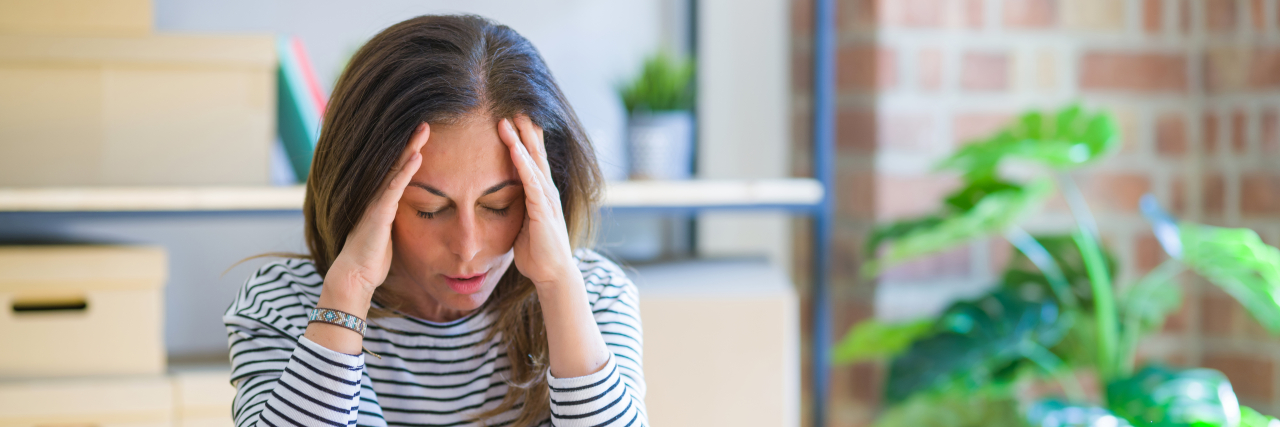After months of illness, physical pain, and inability to do everyday activities without health interruptions, I thought long-haul COVID-19would be my only struggle, and I’d overcome it. I was eager to get back to my life — running my little sewing business and doing the artwork I love.
Back in August 2021, only four months post-vaccination, I contracted the Delta variant of COVID-19, and my symptoms were between moderate and severe but leaning closer to severe. I’d spent my two weeks with the virus and then noticed most of the symptoms didn’t resolve — the headaches, nausea, and chest pain when coughing, along with a host of other symptoms.
Long-haul COVID-19 sent me to the emergency room numerous times with breathing issues, digestive distress, and other debilitating symptoms nobody could explain. The only information I knew for certain was that this was long-haul COVID-19 wreaking its havoc on every cell in my body.
In the last three weeks, my health took another turn. A strange set of symptomatology that all seemed unrelated began having its way with me. From a strange metallic taste in my mouth to unusual chest pains, it felt as though I’d caught COVID-19 yet again.
At first, some symptoms presented as fibromyalgia, but the pain felt deeply rooted in my bones, joints, tendons, and tissues. For about five days and nights, I was experiencing so much physical pain and agony that I couldn’t lie down on any part of my body. It hurt too much to sit, stand, and lie down on my stomach and back, and I found myself sitting on the floor of my bedroom sobbing myself to sleep or even not sleeping at all.
Other symptoms, more personal ones I won’t be listing here, really put me through the wringer, and frequent hospital visits were causing me an undeniable amount of stress and anxiety. One symptom specifically led a nurse practitioner to believe that this was a Behcet’s disease autoimmune flare-up I was experiencing. It was like a funnel cloud had formed above my head and dropped right on top of me, upending everything in my life.
In case you’re unfamiliar with Behcet’s disease, it’s a rare condition that is similar to vasculitis. The autoimmune disease had already spent months attacking my digestive system, immune system, lymphatic system, and many other bodily systems too.
For about three weeks, I’ve been in the middle of an autoimmune flare-up that has been testing me to an extreme degree. To boot, I found out I have not one, but three bacterial infections that have all been utterly distressing. Still, I am relieved knowing this won’t be a forever situation, and it’s treatable and temporary.
Perhaps I’m stronger than I give myself credit for, but the despair I felt in learning that I have Behcet’s disease has affected me on so many levels that words can’t express. There is no way for me to properly articulate what I’ve been going through with this disease.
I’m still learning about Behcet’s disease, but I found myself undeniably angry that my lengthy battle with long-haul COVID-19 has led to it. The toll this autoimmune disease has taken on my mental and emotional health and well-being is irrefutable.
On a better note, though, I’ve heard many positive things about this condition, including that people have been able to successfully tame Behcet’s almost to the point of full remission or to experiencing less frequent flare-ups. I’ve adopted a new way of eating and managing my health and lifestyle and am trying to be patient with my healing process.
Being immunocompromised has made me realize how complex the immune system is in its reactions and responses to vaccines and diseases too.
When I found out that Behcet’s disease is the mysterious autoimmune condition that was causing me so much trouble for all of these months, I didn’t want to accept or talk about it. However, our health is a part of us — whether we like or accept it or not. Our health isn’t the enemy — it can help us find new ways of living that may benefit us even more.
It’s important to find resources that help you work with the sadness and grief a diagnosis like this can cause and be patient with the healing process. I’m utilizing the tools within me to move through this autoimmune flare-up: meditation, nutrition, a holistic approach to treatments, and of course, my art (when my energy allows it). Though I’m not happy about my Behcet’s disease diagnosis, I am hopeful about getting on a new path toward wellness that nourishes and enriches my health and life in the long term.
Getty image by AaronAmat.

